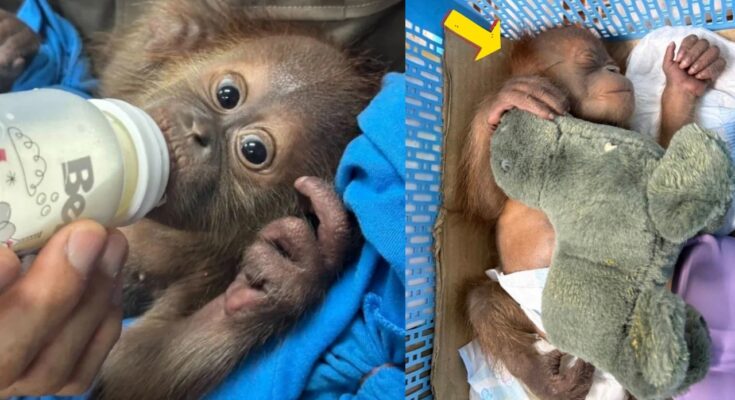Two helpless baby orangutans were found stuffed in plastic baskets at a Bangkok gas station—meant to be sold like merchandise. One just a month old. The other barely a year. This heartbreaking case exposes the dark world of wildlife trafficking.
Hidden beneath woven baskets, their tiny hands trembling and eyes wide with fear, two baby orangutans sat in silence—sold like property, traded like objects. They had been taken from the wild, ripped from their mothers’ arms who likely fought to the death trying to protect them. These helpless infants, no more than a few months old, were stuffed into cramped baskets, their soft cries muffled by cloth and darkness.
They were being trafficked in an illegal sale, with a shocking price tag: $9,000 each. To the black-market dealers, these babies were nothing more than commodities. But to anyone with a heart, they were stolen souls—innocent, terrified, and desperately in need of help.
Thankfully, that help came.
Acting on a tip, a wildlife rescue team staged a rapid-response operation to intercept the illegal transaction. When they opened the baskets, what they found broke their hearts. The baby orangutans were dehydrated, malnourished, and traumatized. Their small bodies were too weak to cry loudly, but their eyes told the story of fear, loss, and confusion.
The rescuers didn’t hesitate. They gently lifted the babies from their baskets, wrapping them in blankets and whispering soft words of comfort. For the first time since being stolen from their mothers, the orangutans felt warmth that wasn’t cruel.
At the rehabilitation center, the babies were slowly introduced to care, love, and safety. They clung tightly to their caregivers—desperate for the comfort they had been robbed of. Bottle-fed, cuddled, and protected, their journey to healing began.
Today, they are learning how to climb, forage, and trust again. But the scars of trauma run deep, and their futures still hang in the balance. Orangutans are not pets. They are not items for sale. They are wild, emotional, intelligent beings—and they belong in the forest, not in baskets.
Their rescue is a victory—but the fight to end wildlife trafficking continues.
